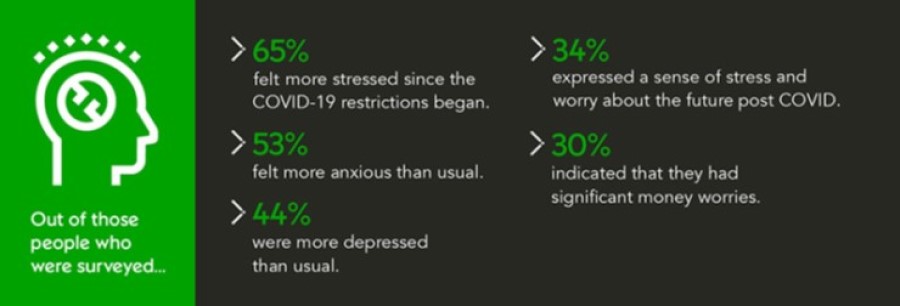Nine tips to help your employees reclaim their social life as restrictions ease

The three main concerns were 'disconnection', 'uncertainty' and a 'loss of control'. As we finally start to emerge from a long winter in social hibernation, we’re sharing tips to help your employees find ways to 'regain connectivity, certainty and control' – the theme of this year’s Stress Awareness Month.
Re-engaging with your social connections
As lockdown subsides, opportunities for resuming social lives are increasing again. However, this can come with a range of conflicting emotions.
Although many of us are desperate to reconnect in person, it's also natural to feel nervous at the prospect. After such a long period of social confinement, we may have become quite comfortable in our own company and space – so the thought of meeting up with people again may result in a sense of pressure or even anxiety.
The tips below can be shared with employees to help them re-engage over the coming months:
1. Expect some social anxiety
It's part of being human, especially since we've all been socially deprived. Like any other activity you haven't done in a while, it will take some time to get back into the habit of interacting with others. You may worry that you've lost your social skills, or your confidence, but these will return as you get back into practice.
2. Don't avoid social situations
Avoidance can often seem like an easy option, but it only reduces anxiety in the short term and actually makes the problem worse in the long term. Avoidance feeds anxiety, and has unhelpful consequences, such as missing out on social or work opportunities. Although it can sometimes be more comfortable to stay in a small and safe-feeling 'bubble', it's not always what's best for us.
3. Ease back in gradually
You may feel pressure to catch up with everyone straightaway. However, doing too much too soon may leave you feeling overwhelmed. There's no need to rush – just as restrictions are being eased gradually, take time to ease yourself back into a social schedule that works for you. Start with maybe one or two activities a week, leaving time to relax and recuperate between each 'new' experience, whether it's meeting up with friends again or going back into bars and restaurants as they open. That way it will feel less daunting as you adjust.
4. Planning can be helpful
If you're nervous about meeting up socially again, planning can help you feel more in control of the situation. Try writing down a list of everything you think you might need to consider. Being prepared will help you feel reassured as you get back into a different routine.
5. Set clear boundaries
Remember that you can manage your environment outside of your home as well as inside. It can be helpful to tell people your boundaries in advance of any meeting, for example letting them know that seating arrangements will be socially distanced.
6. Don't put too much pressure on yourself
People who feel more socially anxious tend to feel that way because they put a lot of pressure on themselves. This can be due to overthinking how they'll be perceived by others in social situations, and fear that they don't 'measure up' socially. It's important to remember that social interactions aren't a performance.
7. Be yourself
Having unrealistic expectations of yourself can be a fast track to social anxiety. You don't have to be an amazing storyteller or fantastically entertaining, insightful or funny. It's impossible to maintain such unrealistic standards, and more importantly, it's unnecessary. Genuine connection is simply about being with other people. Most of us have had a very limited existence over the last few months, so sharing your authentic experiences of lockdown will help you connect more genuinely with others. It's fine to simply share how bored you've been feeling.
8. Focus outwards
Try not to focus on your 'social performance' too much, or you may end up feeling self-conscious. Instead focus on what's going on around you, and what other people are saying or doing. Remember that they're likely to be nervous too – even those who seem really confident. Try not to analyse yourself either during or after the social event as you're likely to focus on your perceived flaws rather than enjoying the moments of human connection. Finally, remember that no one can see how you're feeling. Sometimes what's happening in your body can feel magnified to you, but it's unlikely others will notice.
9. Be kind to yourself
We can sometimes be self-critical about our social interactions, especially if we're lacking in confidence. Make sure you speak to yourself with kindness and encouragement rather than being mean. Celebrate every achievement you've made in taking steps in the social world, no matter how small or insignificant it may feel.
Visit our website for more tips on how to help your employees 'regain connectivity, certainty and control'.
This article is provided by Nuffield Health.
Supplied by REBA Associate Member, Nuffield Health
Nuffield Health are the UK's largest healthcare charity & the market leader in corporate healthcare.







